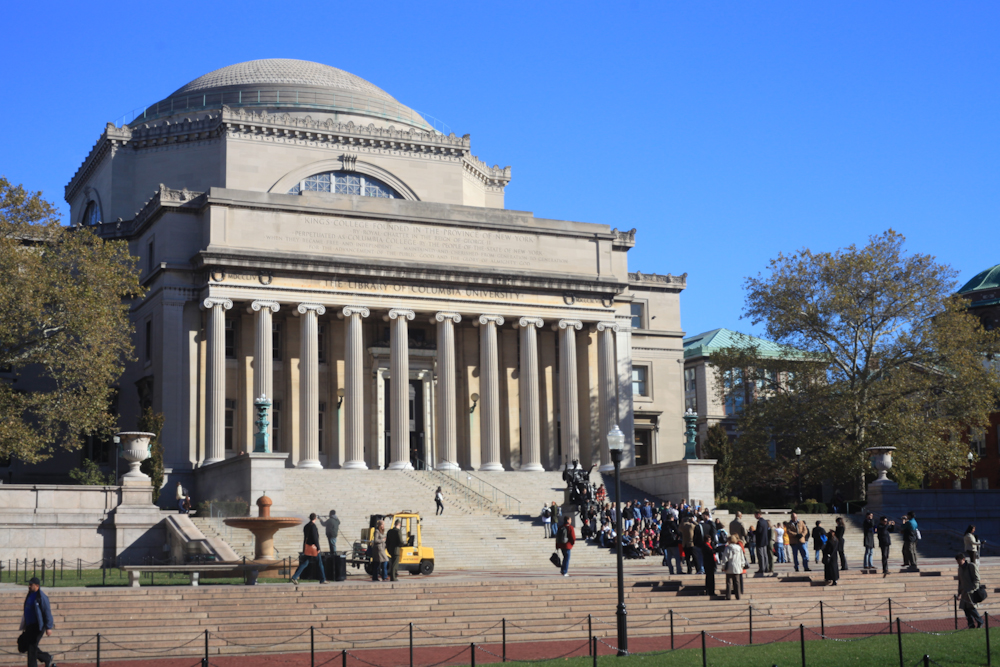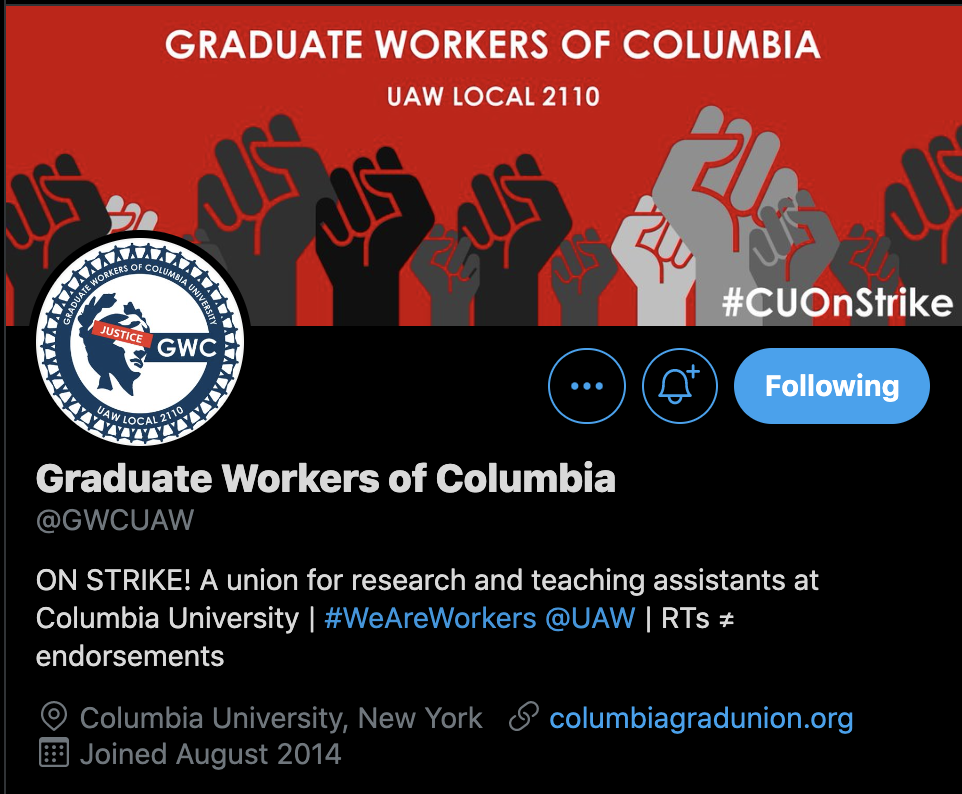
After the National Labor Relations Board withdrew a proposed rule that would prohibit teaching assistants from unionizing at private colleges and universities, Columbia students seek better pay, recognition of full bargaining, and arbitration rights.
By: Heather Lea Ramírez, Law at the Margins Intern
Columbia University research and teaching assistants are currently on strike four years after winning union recognition and two years since contract bargaining began with the school’s administration. As part of the GWC-United Auto Workers Local 2110, students are striking from March 15, 2021 until an agreement is met with the administration. Last spring, student workers voted overwhelmingly for a strike authorization at 96% if contract demands were not met. These demands include neutral, third party, arbitration to dispute outcomes on harassment and discrimination, and to handle cases of bullying; an increase in stipends and summer funding for both hourly and salaried workers, recognition of the full bargaining unit consistent with the NLRB certification, and a healthcare fund.
#CUonStrike comes on the heels of the recent significant March 12, 2021 decision by the National Labor Relations Board (NLRB) to withdraw a proposed rule that would prohibit teaching assistants from unionizing at private colleges and universities. The proposed rule sought to reclassify students as simply as students and non-workers, severely impeding teaching assistants’ ability to organize for higher pay and better working conditions
Columbia graduate students fought for over seven years for a union and fair contract. Organizing efforts began back in 2014 and were met with hostility from the administration through an aggressive anti-union campaign. In 2016, students petitioned the NLRB for union recognition, which was the driving force behind overturning a former 2004 NLRB ruling that designated research assistants not to be workers. The landmark decision held that “students who work as teaching and research assistants have a federal right to unionize.”
After the ruling, Columbia graduate students voted overwhelmingly to unionize and was the first union to represent graduate students at private universities since the 2004 NLRB ruling. Despite student support, Columbia University failed to recognize the union until 2018. Recognition came after grad students went on strike for an entire week and threatened an indefinite strike if the administration did not recognize the union. Since, the administration has both backtracked on previous promises such as recognition of the full bargaining unit designated by the NLRB in 2018 and has failed to move on other issues in bargaining. In the current grad student strike, the administration has used a variety of hostile tactics.
Law at the Margins spoke with Susannah Glickman, a fifth year PhD candidate in the History Department about the current Columbia student strike and the tactics being imployed by the administration.
“They have sent out emails to undergrads asking them to report their instructors for striking. They also set up a hotline for students to report striking instructors which I think it pretty inappropriate to put the undergrads in that position. Especially when they claim they are trying to build this Columbia Community. Nothing about what they are doing with this divide and conquer mentality builds community.”
One of the issues that the administration has backtracked on is the failure to recognize the entire NLRB certified bargaining unit. Glickman shares that the designed unit as determined by the NLRB was: “PhD students and MAs [Master Students] that TA [teaching assist] and RA [research assist] and undergrads who TA or who are course assistants like teaching activities.” She goes on to state, “We are pursuing the full extent of the NLRB unit designation because we feel that everyone has to have protections. The same protections for the same work. If they are TAing, they deserve the same pay, same protections from harassment and discrimination, they deserve better healthcare and all of things that a union can provide. Just because they are undergrads doesn’t mean that they are any less deserving.”

Both public and private universities such as Columbia are increasingly becoming reliant on student teachers, especially during the pandemic. Research and teaching assistants’ labor enable these universities to run. Glickman spoke to the work of student teachers and researchers,
“We teach all the sections, we do all the grading, a lot of the RA’s research kinda makes science happen as well. We bring a lot of prestige to the university and the basic teaching stuff is stuff we do and a lot of us are primary instructors of our own courses like the CC courses are often taught by us. I think they try to make the artificial distinction between our work as PhD students and our work as TAs. A lot of the knowledge production we do on our own dissertations is something that Columbia also benefits from and monetizes. And the [research] from RAs is also something very much that the university profits from.”
In terms of profit, students are calling out Columbia administration’s failure to meet the demand of grad students after they recently reported an increase over $310 million in endowments during the pandemic. Despite receiving funding from the CARE Act and endowment growth, the administration is failing to comply with striking students’ demands, froze non-unionized university workers’ wages, and froze professors’ pensions.
“None of the upper admins have taken a pay cut like they have at other universities. It is embarrassing that our President [Lee Bollinger] ever made $4.6 million dollars in a single year. It is really different to ask us to live on $30,000 and for him to stay at $4.6 million. It is totally unfair when the upper administration can make close to one million or several hundred thousands of dollars or over one million and aren’t willing to sacrifice as well. It is an uneven distribution. On top of which, they have been syphoning off money from Arts and Sciences for years to fund these vanity projects like Manhattanville [Campus] that don’t really give back to the community and the land was acquired in ways that even Donald Trump thought was shady. It is a question of priorities. It is not like they can’t do the right thing. The differences between what we are asking for and what they want us to take is about $14 million dollars for three years a little bit more than three years of Lee Bollinger’s salary.”
The demand being fought for by grad students such as Glickman will have a drastic impact on the quality of life of student workers regardless of program. She is hopeful that “[m]ovements like ours and other labor folks and other student organizing can start to force these institutions to think about what their priorities are and hopefully, work toward relining them.” The potential of these wins will provide a model for other research and teaching students who are currently and will be unionizing given the recent NLRB’s proposed rule withdrawal.
The full list of demands being made by students:
· Full recognition of the NLRB – certified bargaining unit, which is consistent with the Bargaining Framework Agreement of November 2018;
· Union shop, which creates an equitable system of distributing the cost of union representation over all workers in the unit;
· Real recourse for cases of harassment and discrimination, which we demand take a form of access to the grievance and arbitration procedure;
· International workers rights provisions that provide meaningful protections for when the international workers are most vulnerable and that can be enforced through the grievance and arbitration procedure;
· Improvements to compensation and health benefits that create a sustainable work environment for all, not just the ones who have a safety net for loss of funding or extraneous healthcare costs, especially in light of COVID-19 financial difficulties.
To show solidarity with research and teaching assistants at Columbia University and join the picket line physically or virtually, check out the student strike website for a calendar of events including action items for supporters. Students are also asking for donations to the hardship strike fund.
Hashtag:
#CUonStrike




